In 2023, a significant financial shortfall was observed among local government councils across Nigeria, with 352 councils in 17 states and the Federal Capital Territory failing to generate or remit any revenue to their respective state governments. This statistic, reported by the National Bureau of Statistics (NBS), indicates a deterioration from the previous year, where only seven states experienced similar issues. The data sheds light on the broader financial challenges faced by local governance in Nigeria and amplifies ongoing discussions regarding the need for financial autonomy for local governments. These struggles come amid increased scrutiny of resource management at the local level and growing demands for enhanced accountability and transparency.
The situation escalated as the Federal Government, through the Attorney-General and Minister of Justice, Lateef Fagbemi, filed a lawsuit in May 2024 to contest governors’ powers to withhold federal allocations designated for Local Government Areas (LGAs). The legal proceedings culminated in a landmark judgment by the Supreme Court on July 11, 2024, which affirmed the financial autonomy of 774 LGAs across the country. The ruling prohibited state governors from controlling funds earmarked for local councils and mandated that the Accountant-General of the Federation ensure direct payments of allocations into the accounts of LGAs. This decision marked a historic advancement in the quest for financial independence within local governance, highlighting the necessity for increased supervision over how these allocations are managed post-disbursement.
Despite the ruling in favor of financial autonomy, the current data illustrates a concerning trend regarding local council revenues. The NBS report identified states such as Rivers, Delta, and Kano—among others—as failing entirely to generate any income from their 213 local government areas. Furthermore, the report disclosed that only 20 out of Nigeria’s 36 states managed to generate some revenue in 2023, collectively amounting to N37.05 billion. This figure represents a decrease from the N48.7 billion raised by 29 states in 2022, indicating a persistent decline in local revenue generation abilities. The implications of these financial failures are profound, casting doubt on the ability of local councils to effectively serve their communities.
Lagos State emerged as the highest revenue generator in 2023, remitting N10.49 billion from its local councils. Other notable contributors included Ebonyi, which generated N6.13 billion, and Kwara, with N3.35 billion. Oyo, Jigawa, and Edo also contributed significant amounts, though overall collections fell short of prior years’ figures. States like Zamfara, Kebbi, and Bayelsa represent stark examples of local councils facing extreme revenue shortages, emphasizing the need for systemic reforms in local governance structures. This trend highlights the fragility of local economies and raises urgent questions about how resources are allocated and managed at this level of government.
The recent developments in Nigerian local governance call for urgent legislative reforms aimed at enhancing the financial capacities of local councils. With the Supreme Court ruling poised to come into effect in November 2024, there lies a pressing responsibility on both federal and state governments to ensure that councils receive their allocated funds promptly and transparently. Analysts suggest that this shift will not only empower local councils but could also facilitate more robust local economies if accompanied by strict accountability measures. This newfound financial autonomy could serve as a catalyst for improving services and infrastructure at the local level, directly benefitting the populations these councils are meant to serve.
However, while financial autonomy presents vast opportunities for local councils, it also raises significant concerns regarding the management and oversight of public funds. There is a pressing need for enhanced capacity-building initiatives to equip local government officials with the necessary tools and skills to manage new financial responsibilities effectively. Alongside this, public accountability measures must be reinforced to prevent mismanagement or corruption in the handling of local funds. As Nigeria inches closer to a new era of local governance, balancing empowerment with accountability will be key to ensuring that local councils can effectively contribute to national development and enhance the well-being of their constituents.














